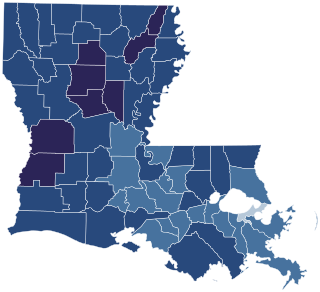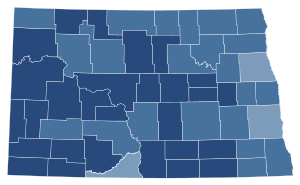The Federal Marriage Amendment (FMA), also referred to by proponents as the Marriage Protection Amendment, was a proposed amendment to the United States Constitution that would legally define marriage as a union of one man and one woman. The FMA would also prevent judicial extension of marriage rights to same-sex couples.

Ballot Measure 36 was a 2004 initiative in the U.S. state of Oregon. It amended the Oregon Constitution to define marriage as a union of one man and one woman. The initiative passed with 1,028,546 votes in favor, and 787,556 votes against in the November 2, 2004 general election. It is one of a number of U.S. state constitutional amendments banning same-sex marriage. However, unlike other similar ballot measures passed on or near the same election date, the amendment did not explicitly ban civil unions between same-sex couples.

Prior to the Supreme Court's decision in Obergefell v. Hodges (2015), U.S. state constitutional amendments banning same-sex unions of several different types passed, banning legal recognition of same-sex unions in U.S. state constitutions, referred to by proponents as "defense of marriage amendments" or "marriage protection amendments." These state amendments are different from the proposed Federal Marriage Amendment, which would ban same-sex marriage in every U.S. state, and Section 2 of the Defense of Marriage Act, more commonly known as DOMA, which allowed the states not to recognize same-sex marriages from other states. The amendments define marriage as a union between one man and one woman and prevent civil unions or same-sex marriages from being legalized, though some of the amendments bar only the latter. The Obergefell decision in June 2015 invalidated these state constitutional amendments insofar as they prevented same-sex couples from marrying, even though the actual text of these amendments remain written into the state constitutions.
The Tennessee Marriage Protection Amendment, also known as Tennessee Amendment 1 of 2006, is a state constitutional amendment banning same-sex unions. The referendum was approved by 81% of voters. It specified that only a marriage between a man and a woman could be legally recognized in the state of Tennessee. This prohibited same-sex marriages within the state, reinforcing previously existing statutes to the same effect until it was overturned by the Obergefell v. Hodges ruling in June 2015.

Amendment 1 of 2004 is an amendment to the Mississippi Constitution that prohibited same-sex marriages from being conducted or recognized in Mississippi. The Amendment passed a public referendum on November 2, 2004, with 86% of voters supporting and 14% opposing.

Initiative 96 of 2004 is a ballot initiative that amended the Montana Constitution to prevent same-sex marriages from being conducted or recognized in Montana. The Initiative passed via public referendum on November 2, 2004, with 67% of voters supporting and 33% opposing.

Wisconsin Referendum 1 of 2006 was a referendum on an amendment to the Wisconsin Constitution that would invalidate same-sex marriages or any substantially similar legal status. The referendum was approved by 59% of voters during the general elections in November 2006. All counties in the state voted for the amendment except Dane County, which opposed it. The constitutional amendment created by Referendum 1 has been effectively nullified since June 26, 2015, when the United States Supreme Court ruled in Obergefell v. Hodges that state-level bans on same-sex marriage are unconstitutional.

South Dakota Amendment C of 2006 is an amendment to the South Dakota Constitution to make it unconstitutional for the state to recognize or perform same-sex marriages, or to recognize civil unions, domestic partnerships, or other quasi-marital relationships regardless of gender. The referendum was approved on 7 November 2006 by 52% of the state's voters.

South Carolina Amendment 1 of 2006 amended the South Carolina Constitution to make it unconstitutional for the U.S. state to recognize or perform same-sex marriages or civil unions. The referendum was approved by 78% of voters. Unlike the other sixteen such state amendments, South Carolina's explicitly disavows any effort to prevent private contracts between same-sex partners from being recognized—Virginia being the only state to do so.

Idaho Amendment 2 of 2006 is an amendment to the Idaho Constitution that made it unconstitutional for the state to recognize or perform same-sex marriages or civil unions.

Nebraska Initiative 416, officially titled "Ban Same-Sex Marriage Act", was a 2000 ballot initiative that amended the Nebraska Constitution to make it unconstitutional for the state to recognize or perform same-sex marriage, same-sex civil unions or domestic partnerships. The referendum was approved on November 7, 2000, by 70% of the voters. The initiative has since been struck down in federal court and same-sex marriage is now legally recognized in the state of Nebraska.

Constitutional Amendment 3 of 2004, is an amendment to the Arkansas Constitution that makes it unconstitutional for the state to recognize or perform same-sex marriages or civil unions. The referendum was approved by 75% of the voters.

Georgia Constitutional Amendment 1 of 2004, is an amendment to the Georgia Constitution that previously made it unconstitutional for the state to recognize or perform same-sex marriages or civil unions. The referendum was approved by 76% of the voters.

Kentucky Constitutional Amendment 1 of 2004, is an amendment to the Kentucky Constitution that made it unconstitutional for the state to recognize or perform same-sex marriages or civil unions. The referendum was approved by 75% of the voters.

Louisiana Constitutional Amendment 1 of 2004, is an amendment to the Louisiana Constitution that makes it unconstitutional for the state to recognize or perform same-sex marriages or civil unions. The referendum was approved by 78% of the voters.

Michigan Proposal 04-2 of 2004, is an amendment to the Michigan Constitution that made it unconstitutional for the state to recognize or perform same-sex marriages or civil unions. The referendum was approved by 59% of the voters. The amendment faced multiple legal challenges and was finally overturned in Obergefell v. Hodges by the U.S. Supreme Court.

Section 15.11 is a provision in the Ohio Constitution that makes it unconstitutional for the state to recognize or perform same-sex marriages or civil unions. Approved as a constitutional amendment in 2004 under the name of "Issue One", it received support from 61.7% of voters.

Oklahoma Question 711 of 2004, was an amendment to the Oklahoma Constitution that defined marriage as the union of a man and a woman, thus rendering recognition or performance of same-sex marriages or civil unions null within the state prior to its being ruled unconstitutional. The referendum was approved by 76 percent of the voters.
Citizens for Equal Protection v. Bruning, 455 F.3d 859, was a federal lawsuit filed in the United States District Court for the District of Nebraska and decided on appeal by the United States Court of Appeals for the Eighth Circuit. It challenged the federal constitutionality of Nebraska Initiative Measure 416, a 2000 ballot initiative that amended the Nebraska Constitution to prohibit the recognition of same-sex marriages, civil unions, and other same-sex relationships.

North Carolina Amendment 1 is a partially overturned legislatively referred constitutional amendment in North Carolina that amended the Constitution of North Carolina to add ARTICLE XIV, Section 6, which prohibit the state from recognizing or performing same-sex marriages, civil unions or civil union equivalents by defining male–female marriage as "the only domestic legal union" considered valid or recognized in the state. It did not prohibit domestic partnerships in the state and also constitutionally protected same-sex and opposite-sex prenuptial agreements, which is the only part that is still in effect today. On May 8, 2012, North Carolina voters approved the amendment, 61% to 39%, with a voter turnout of 35%. On May 23, 2012, the amendment took effect.


















